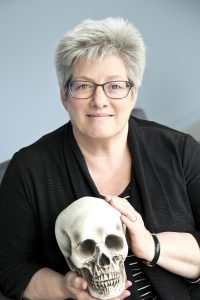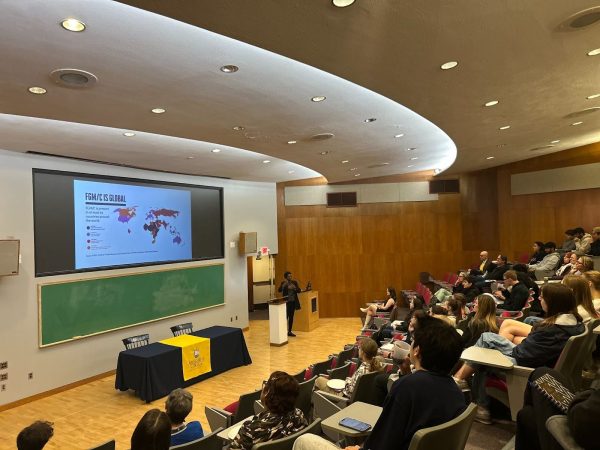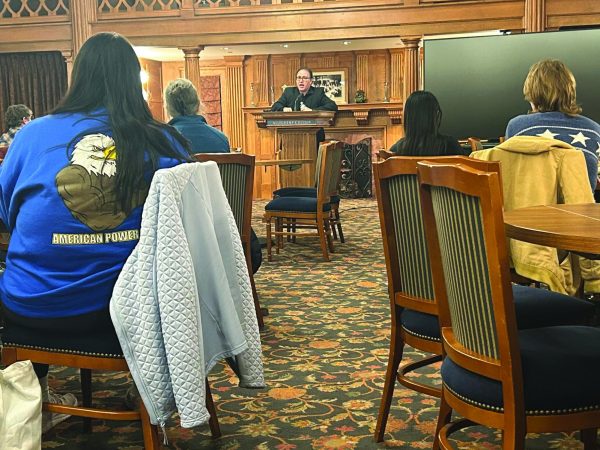Class of 2022 explores Allegheny values in FS programs, exploration
Beginning as first-years, students are encouraged to explore new fields of study at Allegheny College. The first-year/sophomore program helps kick-start that exploration.

Allegheny’s FS program is an element of the curriculum that allows first-year students to delve into different topics. Designed to help students develop a variety of skills including critical thinking, communication and writing, the program serves as an opportunity for students to achieve the four Institution Learning Outcomes outlined by the course catalog.

Professors from all departments at Allegheny put together and teach FS courses that will help incoming students adjust to Allegheny’s academic style. For the fall 2018 semester, first-year students are taking a variety of FS 101 courses like “The Space Race,” “Love, Sex, Marriage, History, Science and Philosophy” and “Theatre and Community.”

Patrick Jackson
Alyssa Ribeiro, assistant professor of history, will take students back in time to look at the Space Race. In the midst of Cold War tensions between the United States and the Soviet Union in the mid-20th century, space exploration became an area of interest and conflict between the two superpowers.
“Part of what I want to achieve with this course is to take an episode of American history that people kind of think they know about, and even they romanticize or idealize, and look deeper,” Ribeiro said. “Because I think a lot of Americans don’t actually know that much of the depth of history behind the Space Race.”
This will be Ribeiro’s fourth year teaching at Allegheny. She teaches courses in 20th-century history, specializing in late 20th-century urban history and race.
“The Space Race” will be Ribeiro’s first FS 101 course. For the class, she wants to start prior to the Cold War period, taking students back to the 1930s and looking into the development of rocket technology in the U.S. and Nazi Germany.
“I also want students to take a look at some of the behind-the-scenes individuals that may not get as much attention,” Ribeiro said.
She wants to focus on instrumental figures other than the famous astronauts of the time. One book students will read, “Rise of the Rocket Girls,” profiles women who helped launch America into space.
“I’ve always been intrigued in the relationship between technology and broader social life,” Ribeiro said. “I went to Georgia Tech engineering school for undergrad, so I’m always keeping an eye on technological influences when I study history, and the Space Race is a great lens to do that through.”
Like Ribeiro, Patrick Jackson, assistant professor of history and religious studies, is also interested in 20th-century American history. During his six years of teaching at Allegheny, Jackson has taught “How to Live,” an FS 102 course with a unit on love every semester.
When planning his FS 101 course for Fall 2018, “Love, Sex, Marriage, History, Science, and Philosophy,” Jackson remembered the great conversations that came about during his FS 102 unit on love.
One goal of a liberal arts education is to “teach people to be skeptical” and wary of received wisdom, Jackson said.
“The place where I think we do the least thinking about received wisdom is our relationship to love,” Jackson said. “It’s so important to all of us, and I thought this would be a good way to show students very early in their career getting a liberal arts education that this (knowledge) is useful. … I think we’d all benefit from thinking pretty rigorously about this thing that’s so important to our lives.”
Throughout the semester, students in Jackson’s FS course will explore love and its relations to biology, the history of marriage and other subjects through five books. One radical subject that will be explored is the concept of polyamory — being in love with more than one person.
“I’m excited to see how far people are willing to go (in discussion),” Jackson said. “Every book is another step out into more radical territory, and I’m interested to see when people get uncomfortable.”
As Jackson’s students explore the topic of love, Professor of Communication Arts/Theatre Beth Watkins will help students think about the concept of theatre in new ways. Watkins’ FS 101 class “Theatre and Community” focuses on theatre as a communal practice.
“I generally focus on performative practice, but we’re also looking at how skills that you use in that can be adapted to other disciplines,” Watkins said. “Academic writing, how to think about connections between the creative process and scientific method, and how all of those things shape how we think, and then how we communicate as scholars.”
In the class, students will write and perform their own monologues, formulate performances based on interviews, produce a short play and practice many additional skills.
“At the end of the semester, we sort of put all (those skills) together and learn how to weave a narrative between those things,” Watkins said.
Watkins said she has enjoyed teaching FS classes during her career at Allegheny. She has enjoyed not only the advising aspect of FS 101 courses, but exploring nontraditional coursework as well.
“Most (students) think of a class as sitting at a desk, maybe they do some reading, get a lecture from the teacher; that’s not what we’re doing in this class,” Watkins said. “They’re having to discuss (and) get up on their feet … It’s just getting them to think outside the … box.”
The courses that Ribeiro, Jackson and Watkins will teach are just three examples of about 30 FS 101 courses different students will engage with throughout the fall semester. Other courses include “Shakespeare on Screen,” a study of Shakespeare’s work and how they relate to contemporary social concerns like race and “Creativity: Bridging Art, Music, and Science,” which delves into the application of creativity in different professions. Other topics, such as the importance of games in human culture and mathematics in fiction, are explored.
Overall, the goals of each FS 101 course include discussing interesting ideas, developing speaking and writing skills and using language effectively. It is the first step in a continuum of three FS courses, junior seminars and senior comprehensive projects that all together help Allegheny students graduate with the ability to communicate complex ideas.







